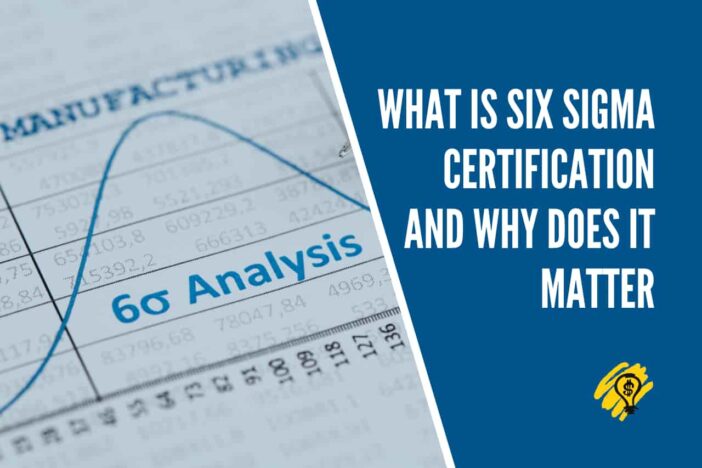Six Sigma Certification is one of the most popular and well-respected certification courses in the world.
It is no secret that the world of technology has changed dramatically over the last decade. Businesses today are competing with a wide variety of other companies, and the competition is getting tougher every day.
In order to stay on top, businesses must continue to innovate, make changes, and implement new technologies. One such innovation is Six Sigma, an advanced quality management method developed in the 1980s by Motorola. Since then, Six Sigma has become widely adopted across numerous industries, including the pharmaceutical, financial, medical, industrial, and food and beverage.
But what is it, exactly? And why does it matter? In this blog post, we will discuss what Six Sigma Certification is, and why it can be so important for your career. We will also provide a few tips on how to get started with Six Sigma training.
Training in Six Sigma Principles
As more and more organizations adopt Six Sigma principles, the demand for certified Six Sigma professionals is also increasing. Six Sigma certification provides individuals with the necessary skills and knowledge to lead successful process improvement initiatives within their organization.
There are different levels of Six Sigma certification, each with its own set of requirements. The most common certifications are Green Belt and Black Belt. To become a Green Belt certified professional, individuals must complete a training course that covers the basics of the Six Sigma methodology.
A lean six sigma black belt certification requires individuals to have a deeper understanding of Six Sigma tools and techniques, as well as experience leading process improvement projects. Organizations often require their employees to be certified to be eligible for certain positions or roles. For example, many Six Sigma Black Belt roles require individuals to have at least two years of experience leading Six Sigma projects.
Understanding Six Sigma Tools
Once you have been Six Sigma certified, it is important to maintain your knowledge of the tools by staying up-to-date with the latest changes. There are a few different ways to do this, but one of the most effective is to find a mentor. A mentor can help guide you through the process of understanding and using the Six Sigma tools, as well as provide valuable insights based on their own experiences.
Another way to maintain your knowledge of the Six Sigma tools is to attend conferences and seminars. These events provide an opportunity to network with other professionals, as well as learn from some of the top experts in the field. Additionally, many of these events offer continuing education credits, which can help you maintain your certification.
Finally, another great way to stay up-to-date on Six Sigma tools is to read books and articles on the subject. There are several excellent resources available that can help you deepen your understanding of how to use the tools effectively. By staying informed, you can ensure that you are always able to utilize the Six Sigma tools to their fullest potential.
Getting a Six Sigma Certification
There are many different ways to get a Six Sigma Certification, but the most common way is through attending a training course. These courses typically last around three weeks and cover all of the necessary material needed to pass the certification exam. After completing a training course and passing the certification exam, you will be able to use the Six Sigma methodologies in your workplace.
The Importance of Six Sigma Certification
There are many benefits to having a Six Sigma certification. For one, it can help you stand out from other job applicants. With the ever-growing popularity of Six Sigma, more and more employers are looking for candidates with this certification. Having a Six Sigma certification on your resume can make you a more attractive candidate and give you a competitive edge.
In addition to helping you get hired, a Six Sigma certification can also lead to career advancement. Many companies use Six Sigma as a way to promote from within. So if you’re looking to move up in your career, getting certified in Six Sigma is a great way to do it.
Finally, having a Six Sigma certification can help you earn more money. Companies are willing to pay more for Six Sigma certified employees because they know they’re getting skilled and knowledgeable workers. So if you’re looking to earn a higher salary, Six Sigma certification is a great way to do it.
Tips for Getting Started with Six Sigma Certification
If you are thinking about pursuing Six Sigma certification, here are a few tips to get you started on the right track.
First, research which type of Six Sigma certification is right for you and your career goals. There are different certifications available through different organizations, so it is important to find the one that best fits your needs.
Next, create a study plan and schedule. Six Sigma certification can be demanding, so it is important to give yourself enough time to prepare for the exams. Find a good study guide or course to help you learn the material and pass the exams. With proper preparation, you can earn your Six Sigma certification and start reaping the benefits in your career.
Finally, stay motivated and don’t give up. The process can be challenging, but it is worth it in the end. Pursuing the Six Sigma certification can help you reach your goals and advance your career. Just keep these tips in mind and you will be on your way to success.
Pursuing the Six Sigma certification requires dedication and commitment, but the rewards are well worth the effort.
Six Sigma Certification Courses
There are a few different types of Six Sigma Certification Courses available depending on your needs and goals. Some courses focus more on the technical aspects of Six Sigma, while others place more emphasis on the management and leadership side of things. Regardless of which type of course you choose, getting certified will give you the skills and knowledge necessary to improve processes and achieve success in any organization.
So why does Six Sigma Certification matter? In today’s competitive business landscape, organizations are always looking for ways to improve efficiency and quality. By becoming certified in Six Sigma, you’ll be able to show potential employers that you have the skill set necessary to help them reach their goals. In addition, many companies offer financial incentives and bonuses for employees who complete Six Sigma Certification Courses.
Whether you’re looking to change careers or simply want to improve your current situation, getting Six Sigma Certified is a great way to set yourself apart from the competition. With the right course, you’ll gain the knowledge and skills necessary to make a real difference in any organization.
A Six Sigma certification can be beneficial for those interested in quality management or process improvement roles. The certification provides a solid foundation of knowledge and skills that can be applied in many industries. For businesses, Six Sigma can help to streamline processes, improve quality, and reduce costs.



